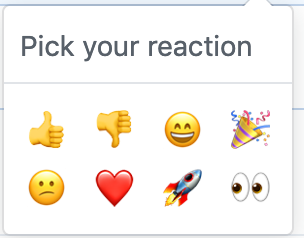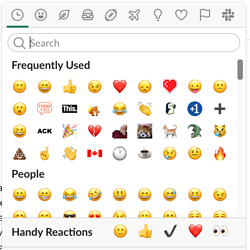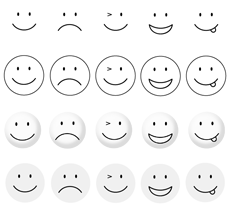12 yes-votes is the majority of people who cared enough about this feature to participate in this poll, which had a total of 15 votes. Would be be nice to have more engagement? Sometimes, absolutely. This Discourse has something around 1200 users who actually participated at least once, which is a very small number of diaspora users. But that’s just the way it is. We can’t force people to participate here, and some people simply don’t care.
Yes, and eating steak would be tastier than drinking water. Having another feature that feels more useful than likes on comments does not change the fact that likes for comments have already support in the federation layer, an established UX concept, as well as general consensus as no one complained about this feature when it was inside diaspora a few years ago.
That’s not even a discussion to have at this point. The primary interaction on posts is called “like” as well, and naming comment-likes a different verb would confuse everyone. We have had many discussions in the past about finding a better verb, but they all died, as it turned out that picking something more suitable that can also be translated in a lot of languages is actually an arduous task. If you have a revolutionizing idea, please find those discussions and resurrect one of them.
We already have likes for posts, and I seriously don’t get the impression that having these changes anything in terms of engagement. diaspora* does not incentivize receiving likes at all - it won’t make the post appear in more people’s streams, it won’t make a post stay there longer. It’s just that - people showing their appreciation.
In contrast, if we’d remove it entirely, I feel like either overall engagement drops significantly, or, even worse, people start posting “nice!” comments, which would make the comment section unreadable for everyone else.
I’ve seen this discussion evolve around the same “interacting with a single click reduces the number of actual comments on a post”, but I have never seen any evidence for that. If anything, those posts which receive a lot of likes also receive a lot of comments, sometimes even from the same people. Also, I’ve seen a lot of posts which don’t receive lots of likes, but a metric ton of comments. This position also seems to forget that sometimes, “I like this.” is simply the only reaction that people might have to a post. That could either be a beautiful photo, a nice story, or something else a user might appreciate without having further opinions or feedback on.
The number of likes is actually a handy tool all by itself. For the HQ account, for example, merely looking at the numbers can teach us that the “where is my feature?” post got more engagement than the “welcome” post. This could teach us to post more development insights and more repeated welcome content. The same is true for people posting comics or photos to diaspora, which can use the number of likes to gauge what kind of content their audience enjoys. That, paired with the fact that there is zero evidence for having a like button actually impacting the non-likes-engagement at all, leads me to the conclusion there is no reason to block someone from re-adding likes on comments - especially since we had them in the past, and only removed them because of a severe flaw in database design.
If we’re accepting that likes are a thing on diaspora* right now, and re-adding them to comments just provides more consistency, we could actually move past this topic and talk about likes in general, which we also had a brief chat on at the hackathon.
No matter how much we like or hate click-interactions, there is no arguing against the fact that they provide a way for users to express their opinions. Our job should not be to take expression away from users because “this is evil, you should write actual comments because everything else is meaningless”. We already limit user’s abilities greatly with the reasoning of privacy concerns, and while that may be fine, I see no base for us not to fulfill that requirement.
What we also can agree on is the fact that having a boolean like feature is not the best situation we could be in. Having only “like” is actually creating a lot of really tricky situations, like the “can I ‘like’ a post talking about sad news?”, for example. The obvious solution to that is to go the way that so many platforms these days do: by leveraging a more broad range of reactions. GitHub, for example, offers several emoji-based reactions:

Slack is taking this idea several steps further, and is simply offering the entire emoji range (plus custom emojis):
And I actually really like this. It makes a huge difference on a post if you react with  ,
,  ,
,  , or
, or  . Having these kinds of interactions would actually get rid of the edge cases outlined earlier. Obviously, that’s not perfect either, as having a bunch of very colorful emojis in an otherwise pretty grayscale user interface will ruin everyone’s eyes and create lots of visual noise. Maybe there are solutions for that - like hiding away the emojis behind a “42 reactions” link and only showing the actual emojis when hovering over that, and/or by making emojis black-and-white per default. Maybe it’s a horrible idea. That’s a discussion to have for future iterations, but by no means is this blocking likes on comments in any way.
. Having these kinds of interactions would actually get rid of the edge cases outlined earlier. Obviously, that’s not perfect either, as having a bunch of very colorful emojis in an otherwise pretty grayscale user interface will ruin everyone’s eyes and create lots of visual noise. Maybe there are solutions for that - like hiding away the emojis behind a “42 reactions” link and only showing the actual emojis when hovering over that, and/or by making emojis black-and-white per default. Maybe it’s a horrible idea. That’s a discussion to have for future iterations, but by no means is this blocking likes on comments in any way.
A acknowledge that the second half of this comment is kinda off-topic and more suitable in a general discussion about likes. If someone resurrects one of those, I’m happy to move the text around.
No, you didn’t even participate. 


